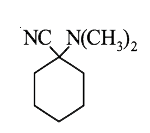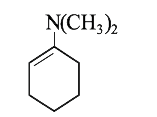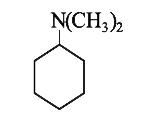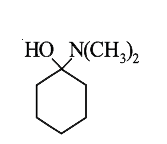Discuss the reaction:

(b) Account of the formation of CH3−CH=CH−CH2CNandCH3−CHCN∣CH=CH2 from reaction of CH3−CH=CH−CH2−Cl with CN−1
Text Solution

The -I effect of two Cl atoms is greater than that of one. Consequently, the proton of CHCl2 is removed more readily by HO− than proton of CH2Cl. Hence, E2 mechanism.

(b) The allylic rearrangement leading to CH3−CN∣CH−CH=CH2 proceeds by an SN2 and not an SN1 mechanism. CH3−CH=CH−CH2−CN results from expected SN2 reaction at C. However, CN− can bond to C3 with nucleophilic π-electros displacing Cl− as allylic rearrangement.

|
Topper's Solved these Questions
- ALKYL AND ARYL HALIDESBOOK - FIITJEECHAPTER - ALKYL AND ARYL HALIDESEXERCISE - SOLVED PROBLEMS [OBJECTIVE]
21 Videos
- ALKYL AND ARYL HALIDESBOOK - FIITJEECHAPTER - ALKYL AND ARYL HALIDESEXERCISE - EXERCISE -1
1 Videos
- ALKYL AND ARYL HALIDESBOOK - FIITJEECHAPTER - ALKYL AND ARYL HALIDESEXERCISE - NUMERICAL BASED QUESTIONS
1 Videos
- ALDEHYDES AND KETONES BOOK - FIITJEECHAPTER - ALDEHYDES AND KETONES EXERCISE - MATCHING LIST QUESTIONS
2 Videos
- ATOMIC STRUCTUREBOOK - FIITJEECHAPTER - ATOMIC STRUCTUREEXERCISE - NUMERICAL BASED QUESTIONS INDICATED BY DIGITAL INTEGER BY XXXXX.XX
2 Videos
Similar Questions
Knowledge Check
The reaction of CH3CN to CH3CH2NH2 is called
AMendius reductionBRosenmund reductionCHoffman reuctionDClemmenson reductionIn the reaction
CH3CH2CCl2CH3x−−→CH3C≡CCH3 the reagent X is -AKOH/C2H5OHBZnCHCl/H2ODNaThe major product of the reaction
 +(CH3)2NhNaBH3CN−−−−−−−−→CH3OH is A
+(CH3)2NhNaBH3CN−−−−−−−−→CH3OH is A B
B C
C D
D
What is the IUPAC name of the compound given below? CH3−CH2−CN∣CH−CH3
View SolutionCH3.CH2CH2Claq.KOH−−−−→CH3CH2CH2OH The reaction is
View SolutionCH3.CH2CH2Claq.KOH−−−−→CH3CH2CH2OH The reaction is
View SolutionThe correct IUPAC name for
CH3−CH2−O−CH3∣CH−CH2−CH2−CH2Cl is:
View SolutionGiven the correct IUPAC namefor CH3−CH2−O−CH3∣CH−CH2−CH2CH2−Cl
View Solution
